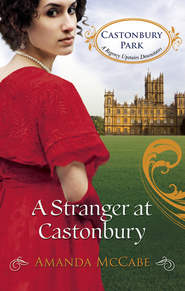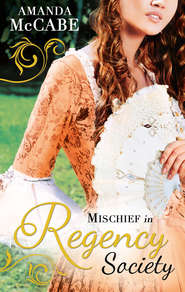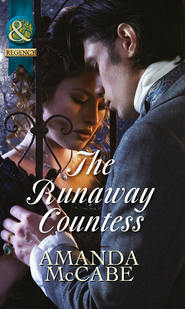По всем вопросам обращайтесь на: info@litportal.ru
(©) 2003-2025.
✖
To Deceive a Duke
Настройки чтения
Размер шрифта
Высота строк
Поля
‘He is miles away,’ she muttered. ‘Eons! You will probably never see him again.’
Yet even as she tried to reassure herself, she knew, deep down inside, that was not true. He might be far away, hidden in his castle, the famously reclusive yet always much sought-after Duke of ‘Avarice’, but he was never entirely apart from her. The way he looked at her, as if she was yet another Greek vase or marble statue he wanted, needed, to possess.
Well, he still had the Alabaster Goddess, that glorious figure of Artemis stolen from Delos, locked away in his castle. He would never do the same to her! Not even if she had to hide here in the wilds of Sicily for the rest of her days. The Duke was gone, he was past. Just like the Lily Thief.
For yes, once even she, Clio, had held her secrets. Had been the notorious Lily Thief for a few glorious months.
Clio unfolded her legs and stood up, stretching her limbs in the sunlight. How lovely it was to be alone, to be herself with no one to watch her, judge her. To just be Clio, not one of the ‘Chase Muses’. Now that Calliope was wed, everyone looked to her to be next. To marry as well as her sister had—an earl!—and to start her own family, her own conventional life as chatelaine of a household, as a society hostess; to take her place in her family’s scholarly, aristocratic world.
But Calliope loved her new husband, was happy in the life she had chosen. Clio had certainly never found anyone she could esteem as Cal did her earl. Clio did not belong in such a life. Maybe she didn’t belong anywhere at all. Except here.
She lifted her spyglass again, training it on the valley below her rocky perch, the stretch of land between her and Thalia’s theatre. It was really this valley that had brought them to Enna in the first place, an ancient Graeco-Roman site buried in a twelfth-century mudslide and only recently uncovered. Much of the site was still hidden beneath hazelnut orchards, but her father and his friends were working hard at exploring what was revealed: the theatre; part of the agora, or market place; some crumbling walls delineating shops and small houses; a great villa with almost intact mosaic floors in the atrium, which was Sir Walter’s pet project; and a small, roofless temple, probably devoted to Demeter, with its bothros, or well-altar, still ready to accept sacrifices even if the grand silver altar set was long gone.
She could see them through the oval of her glass, her father sweeping off more of the mosaic floor as her fourteen-year-old sister Terpsichore—Cory—sketched the tile scenes of tritons and mermaids. Lady Rushworth, shielded by a giant straw hat, examined some newly found pottery fragments, sorting them into baskets. Other friends and servants scurried around like busy ants. They would not miss her when she crept away. They never did.
Clio snapped the glass shut and tucked it inside her knapsack. Slipping the strap over her shoulder, she turned and made her way up the steep stairs cut into the stony hillside.
When she reached a fork in the steps, with one way leading to Santa Lucia, she glanced up, raising her hand to shield her spectacles from the glare of the sun. The crumbling crenellations of the medieval castle’s tower stood starkly against the bright sky, eternally vigilant as it stared out over the valley. She was again reminded of the Duke, of his Yorkshire castle that matched his strangely archaic, handsome appearance, his long red-gold hair, his strong hands that gripped her own so tightly, holding her prisoner to that intense light in his beautiful green eyes.
Clio frowned at the memory, unconsciously flexing her wrists. He could so easily have been one of the crusaders who had built that tower, standing between the crenellations, surveying his conquered land while his banners whipped in the wind behind him. Secure in the knowledge that his money, his exalted title, his fine looks would always gain him anything he wanted. The world was his.
But not her. Never her.
Clio turned away from the castle, from the safety of Santa Lucia and its old walls, and hurried up a second, even steeper set of stairs. They wound up and around the hill, and she soon left the noise and bustle of the valley behind. Even the sun grew dimmer here, the shadows longer, deeper, colder.
On the other side of the hill, the stairs suddenly switched back, taking her downwards again. Unlike the sunny valley where her family worked, this place still slumbered. It was a meadow, covered with a blanket of white clover, seemingly undisturbed except for the hum of bees, the distant tinkle of goats’ bells in the hills.
She knew people must come here. There was rich fodder for those herds of goats, and wild fennel and oregano for the cooking pots. But she never saw anyone at all. The cook at their hired house, Rosa, had told her this was a sacred spot, a spot where once there had been an altar to Demeter. A crude sheaf of wheat carved into the trunk of a towering hawthorn tree, where offerings of flowers and fruit were often left at its base, seemed to confirm that. As did mysterious holes she found in the ground when she had first arrived, which seemed to indicate previous, illegal excavations.
Demeter never disturbed Clio when she was there. Nor did Persephone and her dark husband. They seemed to know Clio was one of them, that she did their work to bring them back to life.
She passed the tree, giving it a respectful nod. There were fresh lemons piled in a basket in its shade. There was a wide road nearby, a way for horses to get to the village, but she ignored it. Along another path, barely marked in the clover, she hurried her steps until she found what she sought. Her own perfect place.
While her father worked on the villa, once the dwelling place of rich men, and Thalia revived Antigone in the theatre, Clio looked for less exalted remains. Her explorations had brought her here, to this quiet little meadow, where she had found her farmhouse.
She paused at the edge of the site, as she always did when she arrived, drinking in the peaceful, quiet vision. It was not the ancient holiday house of a wealthy family, as the villa was. The people here had been prosperous, but they also worked for their coin. Lived off the fruit of their labour and their land. Once, this clover-covered valley had been fields of wheat and barley, with fruit orchards and groves of olives.
Until it all came to an end, one violent day in the second century BC. Now there were just some waist-high walls of small, uneven pieces of tan-coloured limestone, weatherbeaten and crumbling, to mark where their house once stood. But Clio intended to find more. Much more.
She hurried to the walls, pulling out her stash of tools wrapped in oilcloth and tucked into a sheltered niche. The wooden handle of the small spade fit perfectly into her hand, as a soldier’s sword hilt would in battle. Maybe she did not belong in London, not really, but she did belong here. When she worked, she forgot the world outside. She even forgot Averton—for a time.
All the passion she had once poured into the Lily Thief was now given to her farmhouse. To finding the voices of the people who once lived here.
She went to work.
Chapter Two
‘Is it quite satisfactory, your Grace?’ the agent asked, his voice quivering slightly. ‘Truly, it is the finest palazzo to be had in all of Santa Lucia. The views are most exquisite, and it is quite near the cathedral and the village square. And there is a hunting cottage, too, in the hills, if you require it. The baroness is usually very reluctant to leave her furnishings for the tenants, but for you, of course, she is only too happy…’
Only too happy to have an English ducal arse touchher couches? Edward Radcliffe, the Duke of Averton, examined the flaking, worn gilt of the apricot velvet chairs with some amusement. They looked as if the slightest touch would reduce them to a pile of splinters and shredded upholstery. The baroque flourishes of the place, plaster cherubs peering down from the ceilings and faded apricot-coloured silk wallpaper, seemed no better. Chipped and crumbling away, like an abandoned wedding cake.
It could certainly use a thorough cleaning, as well, for the scuffed marble floor was covered with a fine layer of silvery dust. Cobwebs spun from the elaborate frames of old portraits, where the baroness’s exalted Sicilian forebears gazed down at him in disapproval.
Well, they were not the only ones who disapproved, to be sure. Old Italian barons and their long-nosed wives had nothing on one Englishwoman’s contempt-filled emerald eyes.
Edward turned away from them, away from that cool green gaze that haunted him everywhere he went. He leaned his palms on a chipped marble windowsill, peering down at the scene below. The baroness’s palazzo perched at the edge of the hilltop where the village of Santa Lucia gazed out over the valley. The tall, narrow windows, curtained in dusty gold satin and tarnished tassels, stared right at Etna in the distance, to Lake Pergusa and eventually even to the sea.
The palazzo’s small garden, wild and overgrown, seemed to drop off into sheer space. As if an eagle could launch itself into space and go wheeling out over the amphitheatre and into the mist beyond, right from this garden.
The front of the palazzo, on the other hand, sported a much more respectable-looking courtyard, paved and neatly planted with myrtle trees, with tall limestone walls and wrought-iron gates that opened to the narrow street beyond. Its cobblestone length was silent, and seemed rather little travelled, but it did lead right to the village square with its shops and cathedral, its view of the whole village and everyone in it.
Perfect.
‘Tell me,’ Edward said, not turning his gaze from the theatre, ‘where is the house the Chase family rents?’
‘The Chases?’ the agent said, sounding a bit confused. His mind was obviously slow to turn from views and furnishings to the other inhabitants of Santa Lucia. ‘Ah, yes, the family with the daughters! Their home is on the other side of the square, just beyond the cathedral. They are often seen on walks in the evenings.’
So, not far from here. Edward closed his eyes, and it was as if he felt her very presence beside him. The wilful Muse.
‘I will take the palazzo,’ he said, opening his eyes again to the dazzle of the Sicilian sunlight. ‘It is perfect.’
By the next morning, Edward’s battalions of servants had removed the baroness’s dour-painted ancestors and the worst of the gilt furniture and replaced them with choice selections of the Averton antiquities collection. Graceful red-figure amphorae rested on stands under the shocked stares of the plaster angels. A few marble statues took up places in the newly dusted corners, touches of austere elegance amid all the wedding-cake flourishes.
Edward’s own chamber overlooked the front courtyard and the street beyond. The largest bedroom, which was obviously the baroness’s own to judge from the bedhangings draped from a huge family coat-of-arms, looked upon the grand view of garden and hills. But he preferred this smaller space, where he could watch the town and passers-by.
He examined the arrangements as the servants deposited the last of his trunks and crates. Gilded mouldings carved in the shape of roses, wheat sheaves and arrows garlanded the windows and doors, matching the white-and-gold bed and armoire. The blue-and-red carpet was faded and threadbare, as were the coverlets and bedhangings of blue watered silk. It all lacked the medieval grandeur of his Yorkshire castle, the Gothicism of Acropolis House in London. But the mattress was aired, the room spacious enough—and he could see almost the entire town from the window.
Including the edge of the Chase house.
‘It will all do very well,’ he murmured, watching closely as the footmen carried in the last of the antiquities so carefully shipped from London. A statue of Artemis with her bow raised. The famous ‘Alabaster Goddess’. They placed her next to the fireplace, where she looked as if she was about to shoot down a row of simpering porcelain shepherds and shepherdesses on the mantel. Along her base, barely visible in the veined marble, was a scratch mark from a thief’s lever.
Edward traced it lightly with his fingertip, the tiny groove that was the only reminder of that night in the gallery of his London house. Artemis’s cool fierceness always reminded him of Clio. The goddess of the moon, of the hunt—she never let any mortal man stand in the way of what she wanted, what she believed to be right. She never shied away from any danger.
But Artemis was immortal, the favourite child of all-powerful Zeus, who would never let harm come to her. Clio, despite her daring, was all too human. One day her gallant recklessness would surely catch up with her, and she would tumble heedlessly into the danger. Foolish girl.
Edward turned away from Artemis and her bow, and found himself facing a full-length mirror. What a strange vision he was, framed in the gilt flourishes and ribbons of that rented glass! The shoulder-length fall of reddish-blond hair his valet so often hinted he should cut, for the sake of fashion, was tied back. As stark as his black wool coat and white cravat, skewered with a stickpin carved with a cameo head of Medusa. As stark as the sharp cheekbones and square jaw that was the legacy of all the Radcliffes, handed down from some distant Viking ancestor.
Yes, he looked like a true Radcliffe, the heir to the old dukedom, but he was flawed. His nose, thin and straight as a knife blade in the faces of his late father and older brother, was marred by a badly healed break across the bridge. The legacy of a boyish, long-ago brawl with the man who was now Clio’s brother-in-law.
And, a gift from the Muse herself, a jagged scar on his forehead. Healed to a white line now, it was the exact shape of Artemis’s stone elbow.
Edward laid his fingertips lightly on the mark, feeling its slight roughness. Feeling again the fire of her kiss.
Yet he did not let her go then. He could not. It was as if there was a devil inside him, a dark demon that dwelled there, hidden, from the time he was a boy. A part of him that desired Clio Chase no matter what she did—now matter what he did. But he could not let her stand in the way of his work in Santa Lucia.
Edward reached out and tilted the swinging mirror between its hinges until it faced the faded blue wallpaper, and he was hidden from himself. He took off his coat and tossed it over the foot of the bed, rolling up his shirtsleeves to reveal the glint of his ruby-and-emerald rings. His forearms were well muscled and sun-bronzed, the arms of a man who had been working on archeological sites under the southern sun for many of his years. The frilled sleeves hid those signs of un-ducal labour, just as the rings hid the white calluses at the base of his fingers.
It would never do for anyone to see what he was really up to. What the famously reclusive, famously louche ‘Duke of Avarice’ was truly like.











